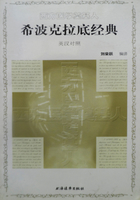Her bedroom, indeed, was the exception, and rich with such profusion as Jenny Cadine or Madame Schontz might have displayed. There were lace curtains, cashmere hangings, brocade portieres, a set of chimney ornaments modeled by Stidmann, a glass cabinet filled with dainty nicknacks. Hulot could not bear to see his Valerie in a bower of inferior magnificence to the dunghill of gold and pearls owned by a Josepha. The drawing-room was furnished with red damask, and the dining-room had carved oak panels. But the Baron, carried away by his wish to have everything in keeping, had at the end of six months, added solid luxury to mere fashion, and had given her handsome portable property, as, for instance, a service of plate that was to cost more than twenty-four thousand francs.
Madame Marneffe's house had in a couple of years achieved a reputation for being a very pleasant one. Gambling went on there. Valerie herself was soon spoken of as an agreeable and witty woman. To account for her change of style, a rumor was set going of an immense legacy bequeathed to her by her "natural father," Marshal Montcornet, and left in trust.
With an eye to the future, Valerie had added religious to social hypocrisy. Punctual at the Sunday services, she enjoyed all the honors due to the pious. She carried the bag for the offertory, she was a member of a charitable association, presented bread for the sacrament, and did some good among the poor, all at Hector's expense. Thus everything about the house was extremely seemly. And a great many persons maintained that her friendship with the Baron was entirely innocent, supporting the view by the gentleman's mature age, and ascribing to him a Platonic liking for Madame Marneffe's pleasant wit, charming manners, and conversation--such a liking as that of the late lamented Louis XVIII. for a well-turned note.
The Baron always withdrew with the other company at about midnight, and came back a quarter of an hour later.
The secret of this secrecy was as follows. The lodge-keepers of the house were a Monsieur and Madame Olivier, who, under the Baron's patronage, had been promoted from their humble and not very lucrative post in the Rue du Doyenne to the highly-paid and handsome one in the Rue Vanneau. Now, Madame Olivier, formerly a needlewoman in the household of Charles X., who had fallen in the world with the legitimate branch, had three children. The eldest, an under-clerk in a notary's office, was object of his parents' adoration. This Benjamin, for six years in danger of being drawn for the army, was on the point of being interrupted in his legal career, when Madame Marneffe contrived to have him declared exempt for one of those little malformations which the Examining Board can always discern when requested in a whisper by some power in the ministry. So Olivier, formerly a huntsman to the King, and his wife would have crucified the Lord again for the Baron or for Madame Marneffe.
What could the world have to say? It knew nothing of the former episode of the Brazilian, Monsieur Montes de Montejanos--it could say nothing. Besides, the world is very indulgent to the mistress of a house where amusement is to be found.
And then to all her charms Valerie added the highly-prized advantage of being an occult power. Claude Vignon, now secretary to Marshal the Prince de Wissembourg, and dreaming of promotion to the Council of State as a Master of Appeals, was constantly seen in her rooms, to which came also some Deputies--good fellows and gamblers. Madame Marneffe had got her circle together with prudent deliberation; only men whose opinions and habits agreed foregathered there, men whose interest it was to hold together and to proclaim the many merits of the lady of the house. Scandal is the true Holy Alliance in Paris.
Take that as an axiom. Interests invariably fall asunder in the end; vicious natures can always agree.
Within three months of settling in the Rue Vanneau, Madame Marneffe had entertained Monsieur Crevel, who by that time was Mayor of his /arrondissement/ and Officer of the Legion of Honor. Crevel had hesitated; he would have to give up the famous uniform of the National Guard in which he strutted at the Tuileries, believing himself quite as much a soldier as the Emperor himself; but ambition, urged by Madame Marneffe, had proved stronger than vanity. Then Monsieur le Maire had considered his connection with Mademoiselle Heloise Brisetout as quite incompatible with his political position.
Indeed, long before his accession to the civic chair of the Mayoralty, his gallant intimacies had been wrapped in the deepest mystery. But, as the reader may have guessed, Crevel had soon purchased the right of taking his revenge, as often as circumstances allowed, for having been bereft of Josepha, at the cost of a bond bearing six thousand francs of interest in the name of Valerie Fortin, wife of Sieur Marneffe, for her sole and separate use. Valerie, inheriting perhaps from her mother the special acumen of the kept woman, read the character of her grotesque adorer at a glance. The phrase "I never had a lady for a mistress," spoken by Crevel to Lisbeth, and repeated by Lisbeth to her dear Valerie, had been handsomely discounted in the bargain by which she got her six thousand francs a year in five per cents. And since then she had never allowed her prestige to grow less in the eyes of Cesar Birotteau's erewhile bagman.














